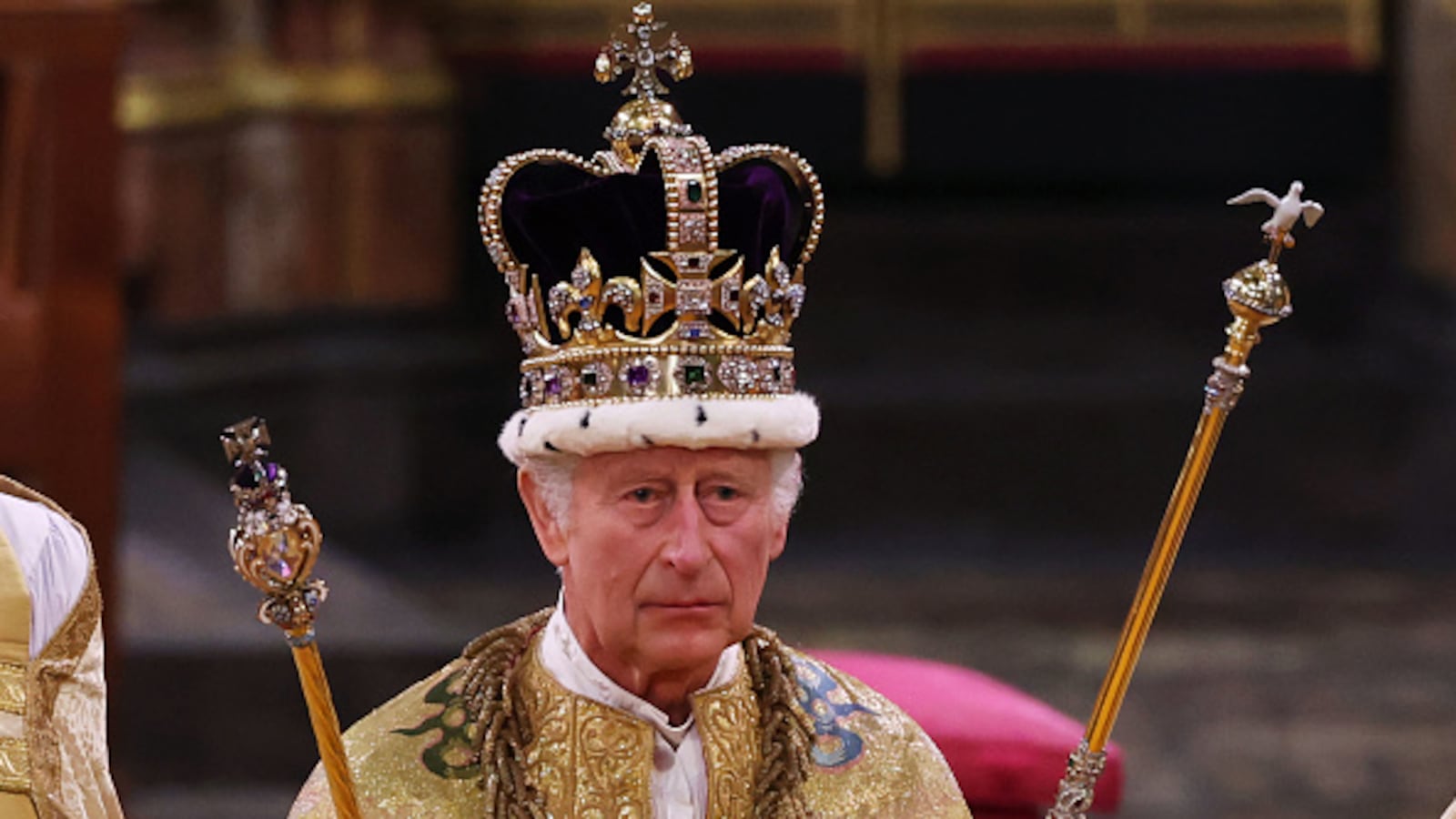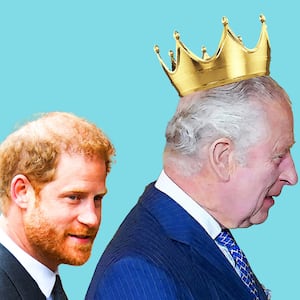Royalist is The Daily Beast’s newsletter for all things royal and Royal Family. Subscribe here to get it in your inbox every Sunday.
Of course, it rained.
Huddled under umbrellas and wearing whatever barriers against the most traditional of British weather, crowds watched as King Charles III was crowned monarch Saturday—the culmination of a seemingly endless wait.
In Westminster Abbey, presented with the ceremonial scepter and rod, a gold-robed Charles was crowned king to cries of “God save the King.” His face did not betray much emotion. With Charles seated on the throne, his son Prince William pledged his loyalty to his father as his heir.
He said: “I, William, Prince of Wales, pledge my loyalty to you and faith and truth I will bear unto you, as your liege man of life and limb. So help me God.” William stood, touched Charles’ crown, and kissed his father on the cheek. Charles said “Amen” and “Thank you William.”
The British people were then invited to pledge their loyalty to the king—a feature of controversy in recent days.
Charles looked inscrutably pensive as the pomp played out around him in the Abbey. There were endless gold coaches, and endless brightly adorned, antic robes, military uniforms, and medals. As she was crowned moments later, Queen Camilla may have reflected herself on how far she had come to reach here—from Charles’ mistress to queen.
Prince Harry, though present, was seated in the third row, well away from his father Charles and brother Prince William.
A source told the Sun: “There were discussions that the seating could be arranged on line of succession. But that would have put fifth-in-line Harry front and centre—and with William and Kate. Instead the decision was working royals only at the front and work back from there. Harry will be a long way from his father.”

Queen Camilla is crowned with Queen Mary’s Crown at Westminster Abbey on May 6, 2023, in London, England.
Jonathan Brady - WPA Pool/Getty ImagesDuring a ritual, jewel-filled ceremony, Charles was crowned with St. Edward’s crown—the same that his mother, Queen Elizabeth II, wore at her 1953 coronation. Camilla was crowned with Queen Mary’s crown.
“I come not to be served but to serve,” Charles said at the beginning of the coronation service.
Administering the oath to the King, the Archbishop of Canterbury asked Charles: “Will you solemnly promise and swear to govern the peoples of the United Kingdom of Great Britain and Northern Ireland, your other realms and the territories to any of them belonging or pertaining, according to their respective laws and customs?”
Charles responded: “I solemnly promise so to do.” In the most secret and mysterious part of the service, Charles was “anointed” behind screens.
Charles and Camilla were driven to Westminster Abbey in the Diamond Jubilee State Coach, and after the service returned to Buckingham Palace in a pomp-filled ceremonial procession in the Gold State Coach.

Britain’s King Charles in the Diamond Jubilee State Coach in Westminster on the day of his coronation in London, England, May 6, 2023.
Marko Djurica/ReutersKate Middleton wore Alexander McQueen to the coronation—as did her daughter Princess Charlotte. Kate, now the Princess of Wales, wore an elegant dress of ivory silk crepe with silver bullion and thread work embroidery featuring rose, thistle, daffodil and shamrock motifs.
In a touching tribute to William’s late mother, she wore pearl and diamond earrings belonging to Diana, Princess of Wales. There was another historical reference in the necklace Kate wore, the George VI Festoon Necklace. It was made in 1950 at the request of King George VI for his daughter Princess Elizabeth (later Queen Elizabeth II), her office said.
Her office said that by request of the king and queen, Kate was not wearing a tiara. Instead she wore a Jess Collett x Alexander McQueen Headpiece with silver bullion, crystal and silver thread work three-dimensional leaf embroidery. Princess Charlotte wore a similar Alexander McQueen dress matched with a cape, as well as a matching headpiece.

Prince Louis and the Princess of Wales at the coronation ceremony of King Charles III and Queen Camilla in Westminster Abbey, London, May 6, 2023.
Victoria Jones/Pool via ReutersPrince Louis wore an outfit made by Dege and Skinner which consisted of a Hainsworth Garter Blue Doeskin Tunic with specially designed lace work embellishment to the collar, cuffs and fronts. Louis came into the Abbey with his parents but left before the service began, as per prior plans.
The day before the Coronation, Charles met well-wishers on the Mall, laughing when asked if he was nervous for the next day when he would be finally crowned king at Westminster Abbey after so many years as an heir-in-waiting. At 74, Charles is the oldest monarch yet to ascend to the British throne; he became Queen Elizabeth’s heir at 3 years old, and has been waiting to assume the title of king for 70 years. Charles’ son Prince William is now his heir.
It has certainly been a long wait for the coronation, as well as a tumultuous few months preceding it. Arguably, the ceremony’s focus was on younger son Prince Harry, who gave his family a comprehensive beatdown in his memoir Spare.
While communication has been reportedly maintained between Charles and Harry—despite Harry’s particularly stinging words for stepmother Camilla—Harry’s relationship with Prince William is in tatters. The coronation service’s historical importance—indeed the fact it is Charles and Camilla’s big day—has taken second place to the ongoing soap opera of Harry and Meghan’s relationship with the royals, and how Harry and the rest of the royals would interact on the day.

Britain’s Prince Harry, Duke of Sussex, attends Britain’s King Charles and Queen Camilla}s coronation ceremony at Westminster Abbey, in London, England, May 6, 2023.
Phil Noble/Pool/ReutersHarry finally arrived at Westminster Abbey 20 minutes before the coronation commenced, as part of a group that also comprised his disgraced uncle Prince Andrew. Also in the group were Mike and Zara Tindall, and Andrew’s children Princess Beatrice and Eugenie, with whom he was due to take a place three rows from the front, and behind working members of the royal family like Prince Edward. As he walked into the Abbey, Harry was patted on the back by Eugenie’s husband, Jack Brooksbank. Harry wore a morning suit while his uncle Prince Andrew wore Garter robes.
After the event, without apparently having spoken to his father or brother, Harry went straight to the airport, and caught a flight home to California.
Charles’ biographer Jonathan Dimbleby told BBC Radio 4’s Today program that the king would find the controversial idea of people pledging their allegiance to him, at a certain moment during the Coronation service, “abhorrent.”
“I can think of nothing that he would find more abhorrent,” Dimbleby said. “He’s never wanted to be revered, he’s never wanted—so as far as I know—to have anyone pay homage to him except in mock terms as a joke. He wants, I think, to feel that people will share in the event and I don’t quite know how this might have happened.”







